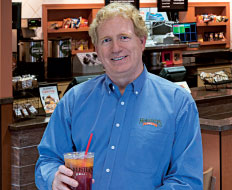What do Phil Jackson, Oprah Winfrey, and Richard Branson have in common? In addition to being well-known personalities and powerful figures in their respective fields, all three have built unprecedented personal leadership brands that transcend their professions and, in some cases, precede their reputations.
Personal leadership branding is just as important in the quick-service restaurant industry as it is for those in the sports, entertainment, and travel sectors, largely due to the direct correlation the public makes between a CEO and his or her brand.
“[CEOs] are a reflection of what the company stands for and what the company is all about,” says Dan Schawbel, a personal branding and workplace trends expert. “That’s the figurehead in the media that people see and look up to and pay attention to.”
Schawbel says successfully building a personal leadership brand in the quick-serve industry can lead to a healthy relationship with the public, often resulting in higher profits. A well-known personal brand can also be a recruiting tool to attract talented individuals who value the leadership style of the CEO, he says.
Phil Greifeld, who has more than 20 years of experience in leadership roles, has been chief executive of Captain D’s since August 2010. He was also the CEO and president of Huddle House restaurants and vice president of Douglass & Waters Inc., a retail home furnishings company that he cofounded. For Greifeld, building a personal leadership brand has been combined with his effort to create an environment in which talented individuals can flourish.
“No brand can be successful without a strong corporate culture supported by values truly embedded in the DNA of the company,” he says. “To me, [a personal leadership brand] is one of the critically important things for any CEO of any
restaurant company.”
A strong personal brand can also permeate the thick organizational infrastructure layers of vice presidents, directors, franchisees, and managers, all of whom have their own management styles and personalities, Greifeld says.
“It’s important for any leader, any CEO, to realize that they are going to make an impression everywhere they go,” he says. “You have incredible opportunities to make impressions with people about the organization you want to be. When you do it correctly and in a positive manner, people pick up on that.”
Nearly two and a half years ago, Frank Paci, CEO of McAlister’s Deli, went through in-store training, which included working the cash register and handling customer orders. Right off the bat, employees got a taste for what Paci was all about when he inquired why the point-of-sale system didn’t have a “No Cheese” button. One was quickly added.
“Little things like that, whether you call it a passion or attention to detail, [show] I am sitting there thinking about the business,” says Paci, whose 25-year career includes leadership roles at Burger King, Pizza Hut, and The Pantry.
Since taking the reins, Paci has infused the company with the same passion for the business and an attention to detail, as well as a willingness to change in order to improve the customer experience—all of which are hallmarks of his own personal leadership brand.
In the quick-service industry, where many concepts are franchised, a CEO must be mindful of his reputation and credibility with franchisees when building a leadership style, Paci says. “I am kind of an orchestra leader rather than a one-man band,” Paci says. “Part of it is not having a problem saying that we messed up and let’s fix it, as opposed to saying we’re infallible.”
While building a personal brand for their own professional development is important, Paci says, CEOs’ reputations must align with the image their concept is trying to portray to the public. To create this synergy, he says, leaders must focus on not just learning the brand’s current research and development, product, and service structures, but also its core values and the historic lineage of how it was created.
“[It’s] almost becoming one with the McAlister’s brand so that I can intuitively feel like the product is something that a McAlister’s customer would appreciate,” he says. “As the face of the brand, there’s an element that the brand and I are very consistent with each other.”
Leaders building a personal brand must also stay true to their values and personality, Schawbel says. This is extremely critical in the age of social media, when a CEO’s every step can be made public, even when he is insulated behind the corporation’s closed doors.
“It has to be natural to the CEO. You can’t fake it. People can read through that,” Schawbel says. “You can act a certain way, but within your company, if the way you deal with management is different, that is eventually going to get out into the real world and your cover is blown. The only way to be successful in building a personal brand is [if] it’s true to you.”
Although a personal leadership brand is important for any CEO to develop and nurture, much of the effort comes down to results, Schawbel says. If the company is successful, consumers will gravitate toward both the CEO and the brand, Schawbel says. “If you focus on doing a great job in your company,” he adds, “then that actually builds your brand and that is something that you can leverage.”













